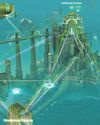
The launch of Stadia at the tail end of last year may have been – and let’s not mince words here – an unmitigated disaster. With only one exclusive title to tempt players who hadn’t already been turned off by reports of the technology’s myriad performance issues, there was scepticism about whether Google’s game-streaming service really did represent the future of play. But perhaps we haven’t been thinking broadly enough about the possibilities. With the muscle of Google’s world-leading infrastructure behind it, Stadia is capable of much more: of not just making playing games more accessible, but developing them.
Google has invested resources in setting up a specialised research and development team within its Stadia arm, composed of ex-game industry employees interested in figuring out how some of Google’s most powerful technology – most notably, machine learning – can be leveraged with regards to games. “The mission of our team is discovering what the data centre as your platform means for games, because it means so many different things,” lead prototype and game designer Erin Hoffman-John tells us. “And we have to start carving away and taking the risks for developers, and then giving them the best of what our risk-taking results in.”
This story is from the May 2020 edition of Edge.
Start your 7-day Magzter GOLD free trial to access thousands of curated premium stories, and 8,500+ magazines and newspapers.
Already a subscriber ? Sign In
This story is from the May 2020 edition of Edge.
Start your 7-day Magzter GOLD free trial to access thousands of curated premium stories, and 8,500+ magazines and newspapers.
Already a subscriber? Sign In

Bulwark: Falconeer Chronicles
Anyone familiar with the concept of kitbashing is already halfway to understanding what Tomas Sala’s open-world builder is all about.

Children Of The Sun
René Rother’s acrid revenge thriller – an action game with its limbs broken and forcibly rearranged into the shape of a spatial puzzler – is at once a bonafide original and an unlikely throwback. Cast your eyes right and you wouldn’t blink if we told you this was a forgotten Grasshopper Manufacture game from the early PS3 era (we won’t be at all surprised if this finds a spot on Suda51’s end-of-year list).

Post Script
What does Rise Of The Ronin say for PS5 exclusivity?

Rise Of The Ronin
Falling in battle simply switches control to the next person up, and then quick revive fixes everything

Post Script
The pawn and the pandemic

Dragon's Dogma 2
The road from Vernworth to Bakbattahl is scenic but arduous. Ignore the dawdling mobs of goblins, and duck beneath the chanting harpies that circle on the currents overhead, and even moving at a hurried clip it is impossible for a party of four to complete the journey by nightfall.

BLUE MANCHU
How enforced early retirement eventually led Jonathan Chey back to System Shock

THE MAKING 0F.... AMERICAN ARCADIA
How a contrast of perspectives added extra layers to a side-scrolling platform game

COMING IN TO LAND
The creator of Spelunky, plus a super-group of indie developers, have spent the best part of a decade making 50 games. Has the journey been worth it?

VOID SOLS
This abstract indie Soulslike has some bright ideas